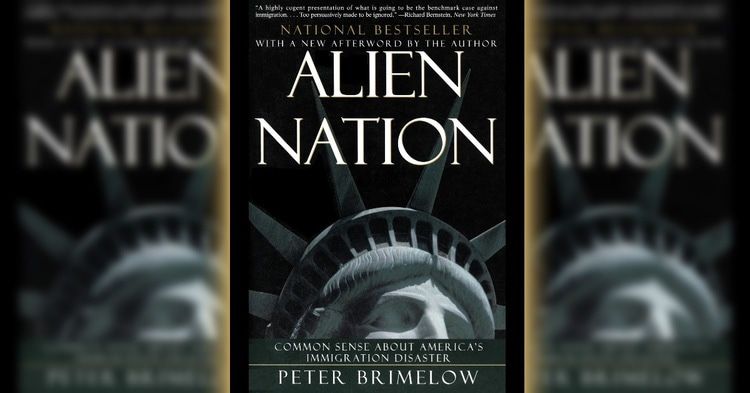


05/08/1995
Fear Of An Immigrant Nation
Ideas: A controversial call for 'racial balance'
Newsweek, May 8, 1995
By Tom Morganthau
If immigration becomes a wedge issue in the 1996 campaign, Peter Brimelow may be the guy who drives it home. Brimelow, born in Britain but a U. S. citizen now, is a Forbes magazine editor who has produced a controversial new book called "Alien Nation" (327 pages. Random House. $24). The book warns that current U.S. immigration policies are a recipe for disaster. Like Pat Buchanan, Brimelow is concerned for the survival of our English-speaking heritage. And like Buchanan, he is unafraid to speak plainly on race and ethnicity. "Race is destiny in American politics," he writes. "It is simply common sense that Americans have a legitimate interest in their country’s racial balance. It is common sense that they have a right to insist that their government stop shifting it. Indeed, it seems to me that they have a right to insist that it be shifted back."
"Alien Nation" in fact does an admirable job of explaining the unintended consequences of the immigration act of 1965, which eliminated the pro-European bias in previous U.S. policy. But the law also led, quite unexpectedly, to much higher levels of immigration, virtually all of it from Latin America, the Caribbean and Asia. Critics say the law’s emphasis on kinship — awarding visas to relatives of immigrants who are already here — has produced "chain migration" by millions of extended families from the Third World. Add the fact, as Ronald Reagan once said, that the United States has lost control of its borders, and you have a policy train wreck. Illegal immigration, including those who abuse the asylum process and those who enter on tourist visas, totals at least 500,000 person spite Congress’s attempt to tighten the system with the Immigration Reform and Control Act of 1986.
By common estimate, upwards of 80 percent of all these "new immigrants" are persons of color, which is where Brimelow’s prejudices come in. Does it matter that the overwhelming majority of these new arrivals aren’t European? Does it matter that by the the year 2050, if current immigration trends continue, the United States will no longer be a white-majority country? Brimelow says it does, and seems alarmed about it. He thinks successful nationhood requires "links by blood." He sees racial and ethnic polarization rising and societal breakdown ahead — like Yugoslavia, he says, or Lebanon. This is racialism, if not racism: Brimelow thinks race counts, though he never actually says other racial groups are inferior to whites. But he implies it, by rehashing tendentious research on immigrant welfare dependency and the net economic burden on native-born citizens, and by making much of the irrelevant ad that immigrants now compose 25 percent of the federal prison population.
You don’t have to be racist to believe that Congress should rethink U.S. policy.
America has welcomed more than 16 million immigrants over the past 30 years, and as Brimelow suggests, the cumulative total of foreign-born residents, now 7.9 percent of the U.S. population, reasonably raises old questions about assimilation and acculturation. What does being American mean in the age of multiculturalism? Which values are essential to our political culture, and how well do we teach them to new immigrants?
Brimelow is right to stress that U.S. immigration has historically been discontinuous, and that interruptions in the flow have allowed the nation to absorb successive waves of the foreign-born. He is also correct in raising the most important issue of all: why, exactly, should large-scale immigration continue?
As he suggests, Washington’s support for further immigration is not supported by the voters — who, in any event, have almost no knowledge of the way our extraordinarily complicated immigration laws actually work. Crucially, the economists' rationale for immigration — cheap labor plus more consumers equals rising GNP — seems less and less relevant to postindustrial societies. As Brimelow says, Japan has risen to a position of enormous national wealth without any immigration at all. If an educated work force is the key to high-tech prosperity, why should America continue to import cheap labor?
These are the real questions about U.S. immigration policy — not race, multiculturalism or even bilingual education. America has long been a pluralistic society, and it has always muddled through. Why should second-generation Pakistani-Americans be less adaptable than their Polish-American counterparts 70 years ago? Brimelow needs reminding that the melting pot still works — and that his alarmist views on race and ethnicity are exactly what country is trying to outgrow.